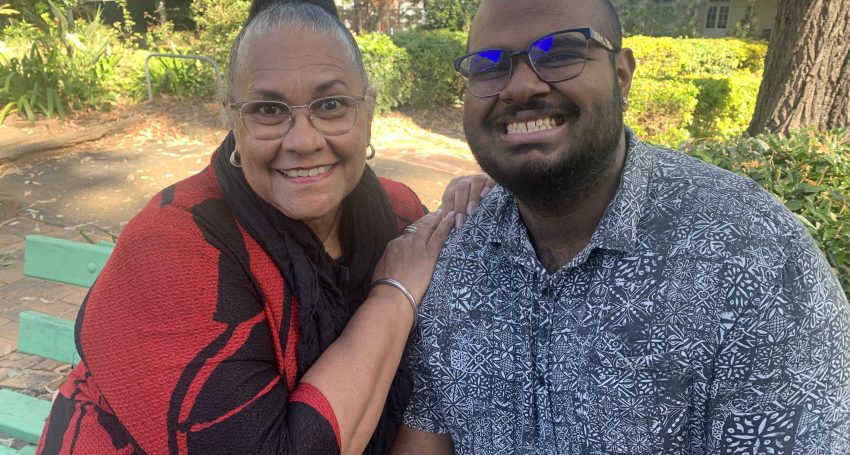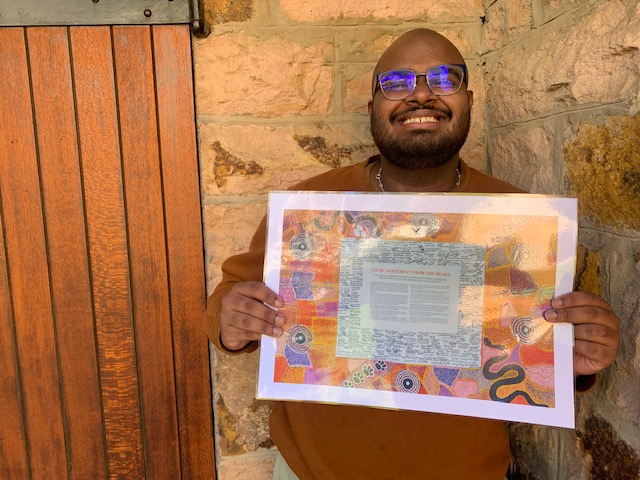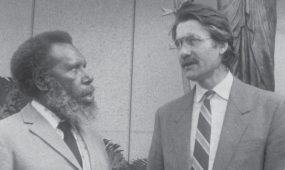When Aaron met the Aunties
Features
“So culture for me is more than about how people look, the dances we dance, the music we listen or the art we create – it’s about how we show love, how we relate to one another,” says Community of The Way member Aaron Vidya Sagar, as NAIDOC Week approaches

When I interact with First Nations peoples, the main way I connect with them is as a Tamil man. Tamils are an ethnic and language group originating from the south of the Indian subcontinent. Tamil is an ancient language that has been spoken for 5,000 years. My family is from Chennai, the capital city of the Indian state of Tamil Nadu, and Madurai, which is also in Tamil Nadu.
I’ve noticed that Tamil and First Nations peoples share similar cultural aspects. For example, recently at a Mabo Day event at Holy Trinity Anglican Church, Fortitude Valley, Aunty Sandra King, the Diocesan Reconciliation Action Plan Coordinator, was relating to me just like one of my aunties would. She asked me about my family, how I am going with my life and why I was wearing a particular hoodie.
Advertisement
At the same event, a Torres Strait Islander Aunty who looked just like my acchi (grandma), who recently passed away, seemed very concerned that I wasn’t eating enough at the event. She also enquired to make sure that I was going to church every Sunday. During the fellowship time, she even gestured to me from the other side of the church hall to make sure that I was eating enough. We had just met that night.
This Elder and Aunty Dr Rose Elu, whom I also met at the event, asked me what island I am from and what my surname is. They were surprised to discover I wasn’t a Pacific Islander and that my surname is Vidyasager.
The ‘aunty’ love that all these Elders, and other First Nations Aunties, show me is the same kind of love that my flesh and blood aunties show me. The way these First Nations Aunties ask about my family and whom I am connected to is shared between my culture and theirs.
So culture for me is more than about how people look, the dances we dance, the music we listen or the art we create – it’s about how we show love, how we relate to one another.
Advertisement
NAIDOC Week celebrates Aboriginal and Torres Strait Islander cultures and traditions. It also celebrates Aboriginal and Torres Strait Islander histories.
I come from a country that was also colonised by the British – we struggled as well. It’s great to see brown people who look like me celebrating their resilience – their cultures, traditions and spiritualities that have endured such hardship historically.
I think it’s really important for kids and adults alike to be proud of their cultures and traditions and the skin they are born in – these make us special and strong. I was speaking to Aunty Sandra about this at the Mabo Day event, and like any loving aunty would, she encouraged me to be proud of being Tamil – to stand up and be proud of who I am, my culture and being a brown man.

“One of the ways we can create systemic change is by learning about and supporting the Uluru Statement From The Heart” (Aaron Vidyasager, Community of The Way member, June 2022)
This year’s NAIDOC Week theme is “Get Up! Stand Up! Show Up!” I think for Anglicans, this year’s theme is a real wake-up call – I think we need to get up and attend events being held during NAIDOC Week. I think we need to stand up against injustices that we see. And, we need to show up when it comes to creating systemic change.
One of the ways we can create systemic change is by learning about and supporting the Uluru Statement From the Heart. In her recent Mabo Day service address, Aunty Rose spoke about how the Statement “is a gift to all Australians – a roadmap to fairness and meaningful change.”
Related Story
 Features
Features
The Mabo case 30 years on: still an icon of rightness and fairness
The Statement calls for an Indigenous Voice to Parliament enshrined in the Constitution. As Aunty Rose says, “By supporting the Voice, we are taking another meaningful step forward towards Reconciliation. A Voice to Parliament that is included in the Constitution will give us all the best chance of finally closing the health and life expectancy gap between Indigenous and non-Indigenous Australians.”
I plan to get involved in NAIDOC Week events – I hope to see you there, whether online or in person.
Editor’s note: NAIDOC Week will be held between Sunday 3 July and Sunday 10 July 2022. Find out more about this year’s NAIDOC Week events by visiting the anglican focus Events page. For more information and resources for this year’s NAIDOC Week, please visit the NAIDOC Week website and the faithful + effective website. For more information about the Voice to Parliament, please visit the From The Heart website.





